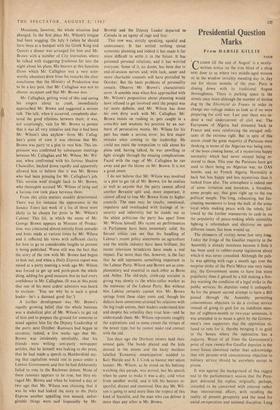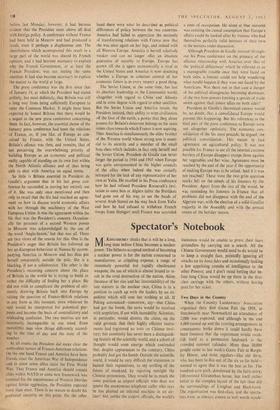Presidential Question Marks
From DARSIE GILLIE PARIS ("1 LOBED till the end of August' is a neatly- written notice on the iron blind of a shop next door to us where two middle-aged women sit in the window invisibly mending day in, day out for eleven months of the year. Paris is closing down with its traditional August thoroughness. There is parking space in the streets once more although the number of ditches dug by the Electricite de France in order to change our voltage makes us look as if we were preparing for civil war. Last year there was in- deed a real undercurrent of civil war. The Europeans of Algeria had streamed back to France and were reinforcing the enraged mili- tants of the extreme right. But in spite of this storm cloud the great majority of Parisians were thinking in terms of the Algerian war being over, of the boys coming home, of a mysterious happy normality which had never existed being re- stored to them. This year the Parisians have got used to there being no Algerian war, no OAS bombs, and no French Algeria. Normality is back but less happy and less mysterious than it looked from afar. The atmosphere is indeed one of some irritation and boredom, a boredom, some people say, that goes right up to the top political steeple. The long, exhausting, but fas- cinating manoeuvre to keep the bulk of the army loyal, while making peace with the rebels, fol- lowed by the further manoeuvres .to cash in on the popularity of peace-making while ostensibly fighting a referendum and elections on quite different issues, has been wound up.
The pleasures of victory never last very long. Today the fringe of the Gaullist majority in the Assembly is already mutinous because it feels it has been used to rubber-stamp legislation about which it was never consulted. Although the pub- lic was spitting with rage a month ago over the surprise strike of the Paris Metro one very rainy day, the Government seems to have lost more popularity than it gained by a bill making a five- Clay warning the condition of a legal strike in the public services. Its deputies voted it unhappily. As for the present second attempt to have a Bill passed through the Assembly permitting conscientious objectors to do a civilian service instead of going to gaol for an indefinite num- ber of eighteen-month or two-year sentences, it was amended in so mean a spirit by the Govern- ment's own supporters that the opposition re- fused to vote for it, thereby bringing it to grief in the Senate where the opposition has a majority. Worst of all from the Government's point of view twenty-five Gaullist deputies in the lower 'house abstained rather than acknowledge that vile persons with conscientious objection to military servici . should be anywhere except in prison.
It was against the background of this ragged end to the parliamentary session that the Presi- dent delivered his replies, originally, perhaps, intended to be concerned with internal rather than international affairs, with recalling the reality of present. prosperity and the need for social co-operation and national discipline. Long before last Monday, however, it had become evident that the President must above all deal with foreign policy. A conference without France had been held in Moscow and had produced a result, even if perhaps a diaphanous one. The cheerfulness which accompanied this result in a large part of the world was shared by French opinion, and it had become necessary to explain why the French Government, or at least the French President, was not feeling the same emotion. It had also become necessary to explain the matter to the world at large.
The press conference was the first since that of January 14, at which the President had stated politely, but most definitely, that Britain was still a long way from being sufficiently European to enter the Common Market. It might have been expected by honest Britons that there would be a sequel in the new press conference concerning them. In fact, however, the essential theme of the January press conference had been the relations of France, or, if you like, of Europe as con- ceived by France, with the United States. Britain's offence was then, and remains, that of not perceiving the overwhelming priority of building Europe as an economic and political entity capable of standing on its own feet within the North Atlantic alliance and of thus being able to deal with America on equal terms.
So little is Britain essential to President de Gaulle's argument that in his last press con- ference he succeeded in leaving her entirely out of it. She was only once mentioned and then only to recall that the Six had reached an agree- ment on how to discuss world economic affairs with her through the machinery of the West European Union. It was the agreement within the Six that was the President's concern. Occasion- ally the presence of a second Western power in Moscow was acknowledged by the use of the word 'Anglo-Saxon,' but that was all. There are two views of the reason for this. One is the President's anger that _Britain has followed up her un-European behaviour at Nassau by accom- panying America to Moscow and has thus put herself temporarily outside the pale. She is a blackleg, if not a collaborator. The other is the President's recurring concern about the place of Britain in the world he is trying to build or rather the difficulty of finding her a place. He did not wish to complicate the problem of ulti- mately drawing Britain back into Europe by raising the question of Franco-British relations in any form at this moment, since whatever he said would be interpreted for polemical pur- poses and become the basis of contradictory and misleading confusion. The two motives are not necessarily incompatible in one mind. Even monolithic men view things differently accord- ing to the time of day and the state of the weather.
At all events the President did make clear the ambivalent nature of Franco-American relations.
On the one hand France and America have been friends since the American War of Independence and in some sense allies since the First World War. That France and America should remain allies within NATO or some new framework was essential for the maintenance of Western liberties against Soviet aggression, the President repeated more than once. There is no reason to doubt his profound sincerity on this point. On the other hand there were what he described as political differences of policy between the two countries. America had failed to appreciate the necessity of transforming relations with France now that she was once again on her legs, and indeed with all Western Europe. America is herself relatively weaker and can no longer offer an absolute guarantee of security to Europe. Europe has grown till she is again economically a rival to the United States and America is now doubting whether a Europe in coherent control of her economic future is in every respect a good thing.
The Soviet Union, at the same time, has lost its absolute leadership in the Communist world, altogether with regard to China and Albania and in some degree with regard to other satellites. But the Soviet Union and America retain, the President insisted, their ability to wipe civilisation off the face of the earth, a power that they alone possess for Britain's deterrent belongs to the same minor class towards which France is now aspiring. Thus America is simultaneously the elder brother of the Western world whose strong arm is essen- tial to its security and a member of the small boss class which includes in fact only herself and the Soviet Union. President dc Gaulle can never forget the period in 1944 and 1945 when Europe was quite unrepresented in the higher councils of the allies when indeed she was casnally. betrayed for the lack of any representative of her own at Yalta. He recalled in his Press conference bow he had refused President Roosevelt's invi- tation to meet him at Algiers (after the President had gone out of his way to see the heads of several Arab States) on his way back from Yalta and how he had refused to withdraw French troops from Stuttgart until France was accorded • a zone of occupation. He alone at that moment was resisting the casual assumption that Europe's affairs could be looked after by trustees who had themselves perfectly valid interests of their own in the matters under discussion.
Although President de Gaulle insisted through- out his Press conference on the primacy of the alliance relationship with America over that of the 'political differences' which he referred to as a manageable trouble once they were faced on both sides, a listener could not help wondering what would happen if they were not faced by the Americans. Was there not in that case a danger of the political divergencies becoming dominant, of the two boss-powers forming a species of trade union against their minor allies on both side?
President de Gaulle's theoretical answer would. be, no doubt, that a consolidated Europe %■ould prevent this happening. But his references in the final part of the press conference to Europe were not altogether optimistic. The economic con- solidation of the Six must precede, he argued, the political consolidation. This meant in fact agreement on agricultural policy. It was not possible fOr France to see all the internal customs barriers of Europe disappear except those against her vegetables and her wine. Agreement must be reached by the end of the year if the opportunity of making Europe was to be seized. And if it was not reached? These were the -two grim question marks left on the minds of his listeners by the President. Apart from the rest of the world, he was reminding his listeners in France that all problems did not disappear with the end of the Algerian war, with the election of a solid Gaullist majority in the Assembly and with the annual return of the holiday season.































 Previous page
Previous page